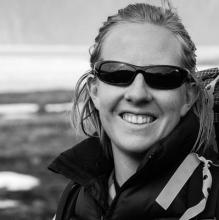Anne Bjorkman
What are your main responsibilities or activities in your current position?
As an Associate Professor, I am responsible for research, teaching undergraduate and Master's level courses, and supervising graduate students, as well as some administrative duties (e.g. sitting on various committees).
How does your current work relate to your graduate degree?
I am still conducting research in a similar field (plant ecology). My graduate work was extremely relevant to the research I am doing now, and also more generally in preparing me to do independent research. Thanks to my supervisor, I also attended several conferences and working group meetings, and I still collaborate with many of the same people I met at those meetings early in my PhD.
What do you like and what do you find challenging about your current position?
I love research, teaching, and supervising, but I find it challenging to balance all three and find just the right mix of each.
What motivated you to pursue graduate work at UBC?
UBC has one of the best programs in the world for Ecology and Evolution. I took advantage of the myriad discussion groups and seminars while I was there, and I feel this really helped me learn how to think critically and analytically. It also helped me to develop a broader understanding of a range of ecological topics and to not just focus on my specialized area of study.
What did you enjoy the most about your time as a graduate student at UBC?
Living in Vancouver, a beautiful city, so close to beautiful nature.
What key things did you do, or what attitudes or approaches did you have, that contributed to your success?
I always knew I'd love to be a professor, but I also knew I could be happy doing many different things. For me it was important to define the things that were most important to my career (and life) happiness, and then realize that there could be multiple paths to achieving them. That took a lot of stress off.
What is your best piece of advice for current graduate students preparing for their future careers?
Networking is key. Other than doing good research and publishing, of course, having a network of colleagues and (potential future) collaborators can be incredibly helpful when looking for a job. As your supervisor to introduce you to people, go to and present at conferences, help organize a working group meeting, etc.
Did you have any breaks in your education?
I took two years between my undergraduate and Master's degrees to work as a research assistant for several different projects. It was a great opportunity to travel the world a bit while also getting relevant research experience.
How did you find out about/obtain your current position?
Academic job listserves and Twitter.
What challenges did you face in your graduate degree, or in launching your career?
I'm pretty happy with how things turned out. If I could go back and do it again, it would just be minor changes, like designing a PhD thesis that involved at least one or two papers I could write with existing data, rather than needing multiple field seasons of data collection for everything and then having to write it all in a rush at the very end.
How are jobs normally posted and filled in your organization or industry?
Academic job list serves (e.g. Ecolog), ecoevojobs.net (Google doc of Ecology & Evolution jobs), Twitter.
